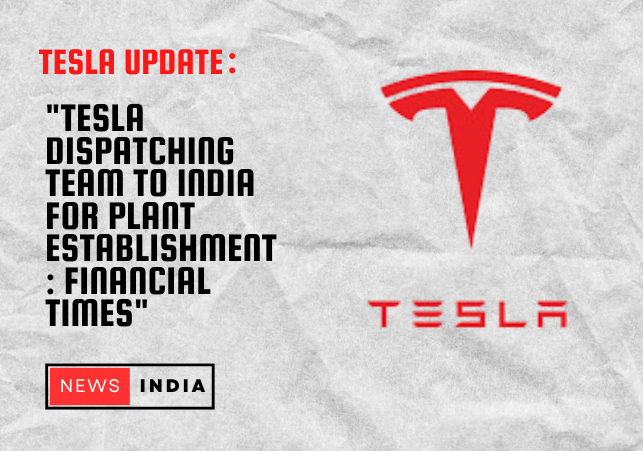

India's EV Policy and Tesla's Entry :
According to a report by News India, Tesla plans to dispatch a team from the US to India by late April. The team's objective is to evaluate potential sites for the establishment of a plant, with a particular focus on states already hosting automotive hubs. Maharashtra and Gujarat in the west, along with Tamil Nadu in the south, are among the regions under consideration. This move reflects Tesla's strategic approach to expanding its manufacturing footprint and capitalizing on India's growing importance in the global automotive industry.
According to a recent report, Tesla Motors, the US-based electric car manufacturer, is set to dispatch a team to explore potential locations in India this month for a proposed investment of $2-3 billion in an electric car manufacturing plant.
The team, scheduled to arrive from the US by late April, will focus on studying the site for the plant. Particular attention will be given to states already boasting automotive hubs, such as Maharashtra and Gujarat in the west and Tamil Nadu in the south.
This development comes shortly after India's Commerce Ministry unveiled a new electric vehicle (EV) policy. This policy relaxes duties for a limited number of EV imports, explicitly targeting manufacturers willing to establish production facilities in India with a minimum investment of Rs 4,150 crore.
India's Growing Automotive Market
Under this policy, completely built-up (CBU) cars can be imported at a reduced import duty of 15 percent. However, there is a restriction on the number of four-wheeled EVs that can benefit from this reduced duty, capped at 8,000 units per year.
The policy is widely perceived as a measure aimed at facilitating Tesla's entry into the Indian market. The company had been advocating for lower import tariffs as a precondition for investing in local manufacturing operations.
India is the world's third-largest automobile market, experiencing rapid growth. The current automotive sector is valued at Rs 12.5 lakh crore, but projections indicate a surge to Rs 24.9 lakh crore by 2030. Notably, the automotive industry contributes over 7.1 percent to India's GDP.
While several automakers have established plants in Haryana, Tesla's exploration may extend to sites around the capital as well. Tesla remained silent on this matter despite the request for comment.
The Financial Times report highlights Prime Minister Modi's encouragement of Tesla's investment in India during his visit to the US last year. Tesla's CEO, Elon Musk, expressed his commitment to this, pledging to enter India "as soon as humanly possible."
Substantial subsidies demonstrate the Indian government's commitment to incentivizing manufacturing, particularly in strategic sectors like electric vehicles (EVs). This push aims to counterbalance China's dominance, especially in the EV segment.
Tesla's potential entry into India includes plans to produce a smaller car model, priced below $30,000, at the proposed factory. This move could facilitate sales in India and enable exports to Southeast Asia, the Gulf region, Africa, and parts of Europe.
Tesla is developing a more affordable vehicle, anticipated to be named "Model 2," and slated for release late next year. However, the company has yet to disclose the manufacturing location for this model.
Simultaneously, Tesla is considering expanding its global factory network. This expansion includes the construction of a plant in Mexico, which, according to the Financial Times, is expected to commence operations in 2026.
Insiders familiar with Tesla's plans suggest an initial investment of $2-3 billion for the Indian car plant. Additionally, suppliers are expected to inject billions more into the project, marking one of India's most significant inward foreign investments.
Once it reaches total capacity, the factory is projected to manufacture up to 500,000 cars annually.
In conclusion, Tesla's exploration of potential manufacturing sites in India underscores its strategic efforts to expand its global footprint and capitalize on the country's burgeoning automotive market. This move aligns with India's recent unveiling of an electric vehicle (EV) policy aimed at attracting foreign investment and fostering local manufacturing. With India poised to become a key player in the automotive industry, Tesla's potential entry promises significant implications for both the company and the Indian economy. Moreover, Tesla's consideration of producing a more affordable car model and its plans for global manufacturing expansion further solidify its commitment to innovation and market expansion. As Tesla navigates these developments, its entry into India could potentially reshape the landscape of the automotive industry in the region while contributing to the country's economic growth and technological advancement.